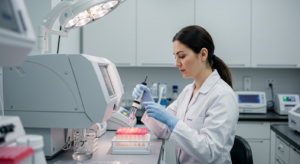Facing Male Infertility? You’re a Team, and We’re Here to Help You Both.
Hearing that male factor infertility might be part of your journey to parenthood can bring a mix of emotions – confusion, concern, maybe even relief to have some answers. You want to support your partner, understand the challenges, and find the best path forward together. Please know, you are not alone. Male infertility is surprisingly common, contributing to nearly half of all infertility cases. This isn’t just “his” issue; it’s a shared experience, and approaching it as a team is the most powerful step you can take. At Ferny, we understand the sensitivities involved and provide comprehensive, compassionate care for both partners.




